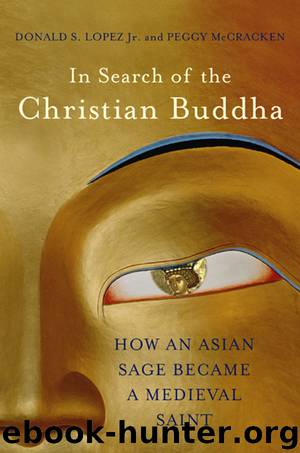In Search of the Christian Buddha by Donald S. Lopez

Author:Donald S. Lopez
Language: eng
Format: epub
Publisher: W. W. Norton & Company
Published: 2014-02-04T05:00:00+00:00
CHAPTER FIVE
The Pious Prince Goes to War:
Gui de Cambrai’s Barlaam and Josaphat
Over the centuries, across two continents and several languages, our tale remains the story of conflict between a father and son. A father loves his only son and seeks to ensure his happiness, but his son seeks a different path, and so father and son are at odds. It is a universal theme and for this reason, perhaps, the legend was much translated. The father is also a king and the son is his royal heir, making the story not just one about how best to live, but how best to rule. However, the son is destined for sanctity, making Barlaam and Josaphat also a story about religion. Its adoption by three great religions also suggests something universal, or at least trans-religious, about its appeal.
The prince’s renunciation of the demands and pleasures of the world is represented as a rejection of his father and the life he has led. The conflict between the father and his son takes a variety of forms. In the story of the Buddha, the king and his son disagree, but with loving words. The king does not dispute the wisdom of his son’s decision to renounce the world, only its timing. In the Arabic version, the argument between father and son is more protracted and the words more heated. Still, both father and son claim to be disciples of the same prophet, al-Budd. The shared recognition of the prophet unites Būdhāsaf and King Junaysar even as they dispute the meaning and implications of al-Budd’s teachings. In the Georgian adaptation al-Budd has disappeared, and the father’s idolatry and the son’s ascetic beliefs are more clearly in conflict. The opposition between idolatry and Christianity is accentuated in subsequent versions of the story, and it defines the relationship between the father and the son.
Although the outlines of the story remain highly consistent as it is translated and adapted over hundreds of years, the relationship between the father and the son evolves and changes in the different versions of Barlaam and Josaphat. The Georgian Balavariani represents King Abenes not just as a pagan but as a king “utterly immersed in the pursuit of the pleasures and delights of this world and enslaved by his own passions, and quite unable to exercise any restraint in respect of indulgences which are so pernicious to the soul.” Believers in Christ and holy monks in his land detest the king’s attachments to worldly pleasures and begin to preach about the transitory nature of the world and all its affairs. The king’s reaction is notably political in the Balavariani: he fears the consequences of the Christians’ teaching not just for his religion, nor even primarily for his religion, but for the wellbeing of his kingdom. In an exchange with Christian ascetics, he explains that he persecutes them because they set a dangerous example—if everyone were to renounce the world, society would collapse: “This wrath of mine serves as a lesson both for them
Download
This site does not store any files on its server. We only index and link to content provided by other sites. Please contact the content providers to delete copyright contents if any and email us, we'll remove relevant links or contents immediately.
Resisting Happiness by Matthew Kelly(3337)
The Social Psychology of Inequality by Unknown(3018)
Day by Elie Wiesel(2779)
Designing Your Life by Bill Burnett(2740)
The Giving Tree by Shel Silverstein(2336)
Human Design by Chetan Parkyn(2068)
The Supreme Gift by Paulo Coelho(1962)
Angels of God: The Bible, the Church and the Heavenly Hosts by Mike Aquilina(1954)
Jesus of Nazareth by Joseph Ratzinger(1811)
Hostage to the Devil by Malachi Martin(1800)
Augustine: Conversions to Confessions by Robin Lane Fox(1769)
7 Secrets of Divine Mercy by Vinny Flynn(1737)
Dark Mysteries of the Vatican by H. Paul Jeffers(1704)
The Vatican Pimpernel by Brian Fleming(1699)
St. Thomas Aquinas by G. K. Chesterton(1632)
Saints & Angels by Doreen Virtue(1603)
The Ratline by Philippe Sands(1571)
My Daily Catholic Bible, NABRE by Thigpen Edited by Dr. Paul(1496)
Called to Life by Jacques Philippe(1475)
